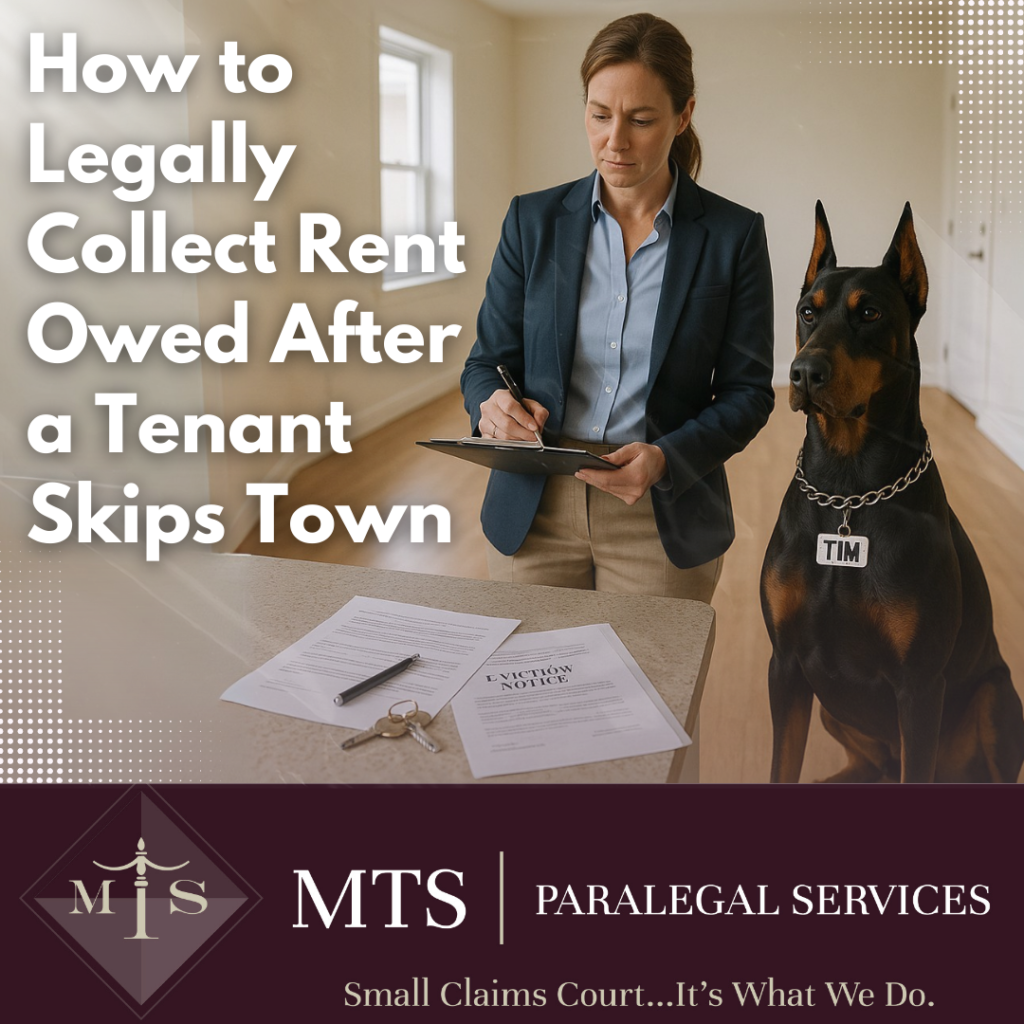
How to Legally Collect Rent Owed After a Tenant Skips Town
Few situations are more frustrating for landlords than discovering a tenant has vacated a rental unit without paying the rent owed. When a tenant “skips town,” landlords are left facing financial losses and uncertainty about how to recover the outstanding balance. Fortunately, Ontario landlord tenant law provides clear avenues for landlords to pursue unpaid rent and damages.
Tim at MTS Paralegal Services regularly represents landlords before both the Landlord and Tenant Board (LTB) and Small Claims Court, ensuring claims are properly filed and presented for maximum recovery.
Step One: Confirm the Tenant Has Vacated
Before taking legal action, a landlord must confirm that the tenant has truly abandoned the unit. This includes:
- Checking whether the tenant’s belongings have been removed
- Verifying that utilities have been disconnected
- Attempting reasonable communication with the tenant to confirm they are not returning
Documenting this process is critical, as evidence may be required later to show the unit was abandoned. If there is uncertainty, the LTB can make a formal determination about abandonment.
Step Two: Calculate the Outstanding Rent and Damages
Landlords must carefully calculate the total amount owed. This can include:
- Rent arrears up to the date of abandonment
- Unpaid utilities, if outlined in the lease
- Physical damage to the unit beyond normal wear and tear
It’s important to separate rent and utility arrears from property damage, as each may follow a slightly different legal process. Keeping accurate records will strengthen the case.
Step Three: Apply to the Landlord and Tenant Board (LTB)
If the tenancy is still active when arrears occur, the correct forum is the Landlord and Tenant Board. Under the Residential Tenancies Act, 2006 (RTA), landlords can file an application with the LTB to recover unpaid rent, utilities, and other amounts owed. If successful, the LTB will issue an order that can later be enforced through the civil court system as a judgment.
For Former Tenants: L10 Application
Since September 1, 2021, Ontario law allows landlords to use Form L10 – Application to Collect Money a Former Tenant Owes when a tenant has moved out.
- The L10 must be filed within one year of the tenant moving out.
- It can cover rent arrears, unpaid utilities, and damages.
- Once granted, an LTB order is enforced through the courts in the same way as any judgment.
Tim at MTS Paralegal Services helps landlords prepare documentation such as the lease, payment history, and communications to ensure the LTB process goes smoothly.
Step Four: Consider Small Claims Court
If the L10 window has expired or if the claim falls outside the LTB’s jurisdiction, landlords can pursue recovery through Small Claims Court. This is the proper venue for:
- Cases filed more than one year after the tenant moved out
- Debts or damages not covered by the RTA process
- Claims where the LTB has no authority to act
Currently, Small Claims Court can hear cases up to $35,000, but as of October 1, 2025, that limit will increase to $50,000, giving landlords greater access to recover larger arrears or damages.
To succeed in Small Claims Court, landlords must provide strong evidence such as:
- The signed lease agreement
- Proof of non-payment (bank statements, ledgers, etc.)
- Photos of damage or proof of utilities owed
- Records of communications with the tenant
A judgment from Small Claims Court can be enforced by garnishing wages, seizing bank accounts, or registering liens against a tenant’s property.
Step Five: Preserve All Evidence
Regardless of whether you proceed through the LTB or Small Claims Court, evidence is the foundation of a successful claim. Landlords should keep:
- The signed rental agreement
- Detailed payment records and bank statements
- Emails, texts, or letters sent to the tenant
- Photos and inspection notes taken at move-out
Thorough documentation strengthens your position and helps prevent delays in the recovery process.
Why Professional Representation Matters
Navigating Ontario landlord tenant law involves more than just filling out forms. Choosing the correct forum, understanding jurisdictional rules, and responding to tenant defences require careful legal strategy. A mistake in process can delay or even prevent recovery of owed rent.
Tim at MTS Paralegal Services has extensive experience representing landlords at both the LTB and Small Claims Court. With the upcoming increase to the Small Claims Court limit, Tim ensures landlords can pursue the full amount owed when tenants vacate without paying.
For tailored legal advice and effective representation, call Tim at MTS Paralegal Services at (226) 444-4882 or visit mtsparalegalservices.com.
This content does not constitute legal advice. For up-to-date guidance or legal advice specific to your situation, please contact MTS Paralegal Services Professional Corporation or call (226) 444-4882.
